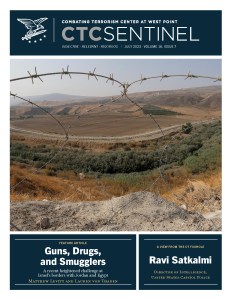From the Editor
In this month’s feature article, Matthew Levitt and Lauren von Thaden examine the recent heightened smuggling challenge at Israel’s borders with Jordan and Egypt. They write: “The guns and drugs that are flowing into Israel are creating societal problems and public safety issues. The influx of weapons is also a major counterterrorism concern. Smuggled weapons have been a contributing factor to the surge of violence that has plagued the West Bank and Israel.” Building on the assessments of Israeli, Jordanian, and Egyptian officials, their study draws on a dataset they compiled of “105 cases of identified, thwarted, or disrupted weapons or drug smuggling attempts into Israel from March 2021 through April 2023 across all of Israel’s borders.”
Our interview is with Ravi Satkalmi, the director of intelligence of the United States Capitol Police. He describes the post-January 6 security challenge as “fundamentally different than that posed by 9/11. The risk is fundamentally different when we’re discussing this kind of normalization of political violence against each other—an erosion of our civic norms—rather than a terrorist organization seeking to launch an attack from overseas.” He says that “our goal is essentially to be the premier intel shop for anti-government violence, full stop. We are sitting on a vast trove of threat information that’s being sent to us by our members’ offices and that we are finding on our own. And the key distinction here is we get it from all sides all the time. We’re protecting Democrats; we’re protecting Republicans, people of all political persuasions.”
Satkalmi came out publicly as a gay man while previously working at NYPD and describes the importance of inclusivity in the national security and counterterrorism domain. He notes that “essentially, anybody can experience the challenge of belonging and anybody can be part of the solution. If we can check some of our own assumptions about who may be struggling and who effective change agents can be, we improve the likelihood for progress.”
Tore Hamming draws on a new cache of Islamic State documents he collected to examine how the Islamic State’s General Directorate of Provinces has managed the Islamic State’s global network. He writes: “With the deaths of successive caliphs, the territorial demise in the Levant, and the growing importance of its external provinces, the General Directorate of Provinces has emerged as the organization’s most decisive body.” His article “describes the institution’s decisive role in the group’s military and economic affairs and its growing responsibility managing its external attack planning and execution.”
Paul Cruickshank, Editor in Chief
 Skip to content
Skip to content

